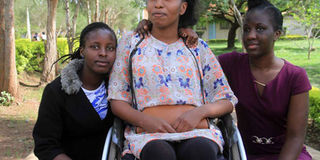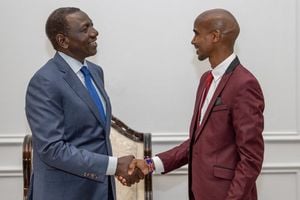‘I’m at peace with what fate has served me since Shabaab raid’

One of the victims of the Garissa University College attack Rachael Munjiru (centre), and her sister Emma Wanjiru (left) and friend Sandra Nyawira on March 29, 2018. She is at peace with what fate has served her. PHOTO | JEFF ANGOTE | NATION MEDIA GROUP
What you need to know:
- After the attack, Rachael underwent seven surgeries, including one in India, to remove bullet fragments lodged in her spinal column.
- The darkest aspect of the college attack is that it targeted young adults in the prime of their youth.
One warm afternoon at the start of December last year, I visited Ms Rachael Munjiru, who survived the 2015 Garissa University College attack, in her Gathaithi village home at the foot of the Aberdare hills, 80 kilometres north of Nairobi.
I was welcomed into her humble wood-and-mud house by her father, Julius Gikonyo Macharia, who served me a late lunch of potatoes, meat, and cabbage, washed down with copious amounts of pale tea.
Rachael was preparing to report for the second semester of her first year at Kenyatta University where she is studying psychology and counselling.
A Good Samaritan from South Korea is paying her university fees after reading about her plight on the internet.
CHRISTIAN UNION
On April 2, 2015, Rachael, 23, and her circle of Christian Union friends were about to conclude their morning prayers when they were rudely interrupted.
It was about 5.30am and they had just joined hands to say the Lord’s Prayer when two wild-eyed men wielding AK-47 assault rifles stormed the classroom where they were gathered and opened fire.
Rachael, stunned by the staccato of gunfire and grenades exploding around her, prayed for her life but expected the worst.
She heard the screams of fellow students pinned down by two other attackers in hostels nearby.
Lying on her stomach and facing the door, Rachael witnessed the first of her colleagues fall to the assailants’ bullets.
SURVIVE
One of the militants then stood behind her. She closed her eyes tightly.
She heard the hard squeeze of the trigger followed by the quick release of bullets.
Someone beside her let out a short, sharp scream and went silent. Next it was her turn. Rachael absorbed 11 bullets in her small body.
She was not supposed to survive, but she did — with injuries that changed her life.
At the end of the 10-hour ordeal, 142 students lay dead, most of them shot in the back as they tried to flee.
Six security officials were killed, too, as well as the four attackers, who were led by a young law graduate from the University of Nairobi.
SURGERY
Over 79 other people sustained injuries. From the group of 30 Christian Union students who had gathered that morning to pray, eight survived.
After the attack, Rachael underwent seven surgeries, including one in India, to remove bullet fragments lodged in her spinal column.
She is scheduled to return to India for another surgery to stimulate her nerves, which will enable her to walk again and resume normal life — but that is if her family manages to raise the Sh2 million cost of the operation.
The day we met, she wore a heavy brown sweater and sat on a wheelchair, her ruined legs covered with a cream blanket.
Next to her sat her sister and four little cousins who amused themselves by making faces at each other.
Rachael has become a national symbol of resistance to the barbarity of Al-Shabaab.
She spoke deliberately and took time to find appropriate words when I asked what she thought about Kenya’s military operation in Somalia.
“I am not sure what I feel about it,” she told me in Kiswahili. Egged on by her father who urged her to “speak her mind”, she conceded, “I guess all these attacks would not have happened if the military was not in Somalia.”
MEDICATION
Mr Gikonyo then switched the topic to his daughter’s preparations to return to college.
He later explained out of her earshot that the family did not wish to come across as ungrateful to the government, which had paid most of his daughter’s medical expenses.
Nightfall was creeping in as I left their humble home.
One of Rachael’s young cousins wheeled her into a room for rest as I bade her goodbye.
Her father asked me for a ride to Thika, the nearest big town, to buy fish, a treat for his daughter.
In the car, I noticed that he was unusually quiet.
He explained that he was running out of money for his daughter’s medication and the special diet, which cost the family Sh600 a day — a veritable fortune for them.
EXPENSES
A proud man who had always taught his children not to expect free things from people, he now depends on the generosity of others to sustain his daughter.
I gave him some money for that week’s bills.
In front of his wounded daughter, he had been composed throughout my interview, but in the car he betrayed a hint of anger and frustration at the whole situation.
“A few people sit in big offices and make decisions that affect the small man without even caring for his opinion,” he said, in reference to decisions he believes have affected the security situation.
His wife passed away a few days after Christmas of 2015, just before their daughter was discharged from hospital.
She died of a stroke, “and a broken heart”, as a result of worrying too much about their wounded child, he said.
The burdens of raising their four children all alone — the lastborn being just five years old — weighed heavily on his mind.
YOUNG ADULTS
He was forced to abandon his bicycle repair business to take care of his daughter.
“It is a full-time job,” he said, adding that he has sold everything he could to cater for her treatment and comfort.
The darkest aspect of the college attack is that it targeted young adults in the prime of their youth, bearing not only their own dreams but also those of their families.
Rachael, the eldest of four children, is the first in her family to go to university.
Her father, a peasant farmer, threw a party for his family to celebrate her admission to the university. “It was a milestone for us.”
APPEAL
Rachael hoped to land a job as a secondary school teacher after graduating to help her parents pay school fees for her siblings and build them a nice house. It now seems like a distant dream.
Mr Gikonyo zipped up his faded brown jacket. “This war has brought me a lot of bitterness,” he told me as he stepped out of the car and waved goodbye.
“But maybe some day I will see the positive side of it.”
Late last year, I sent text messages to more than 30 influential politicians, top government officials, lawyers and businessmen in my phonebook, making a medical appeal on behalf of Rachael.
Based on her past experiences with politicians, she was sceptical if my approach would work but gave me her blessings nonetheless.
Out of those I contacted only three responded.
POLITICIANS
The first to do so within minutes of receiving my SMS was Nairobi County Governor Mike Sonko.
He was willing to help, he said, but only to add to what Rachael’s Mt Kenya leaders had raised for her.
None of the leaders from the region ever responded to my SMS.
A few days later, a representative of the industrialist billionaire Manu Chandaria called and told me sorry, the businessman does not fund such individual cases.
The last call was from Emmanuel Talam, the director of communications at Deputy President William Ruto’s office.
He asked me for Rachael’s mobile phone number.
EDUCATION
However, she told me no one has ever called her from the DP’s office or from State House, where I reached out on her behalf to three senior officials working there.
This week, I met Rachael again at Kenyatta University where she is pursuing a degree in counselling psychology.
She was wheeled from her hostel to our interview by her sister, Emma, also a student at the university.
Rachael couldn’t resist a smug I-told-you-so smile about my aborted efforts to help her. She had experienced it all before.
But during the recent interview there was something different about her. She is at peace with what fate has served her, she told me.
“I don’t have the many regrets I used to have. I have already moved on. I am alive and that is what matters the most,” she said.





